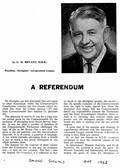National petition campaign, 1962-63
In 1962 the Federal Council for Aboriginal Advancement (FCAA) Annual Conference decided to run a national petition campaign. The goal was to collect a quarter of a million signatures from all states.
The core Melbourne executive of Gordon Bryant, Stan Davey, Doug Nicholls, Barry Christophers and Shirley Andrews worked on a carefully worded draft which was sent to delegates in other states for refinement.
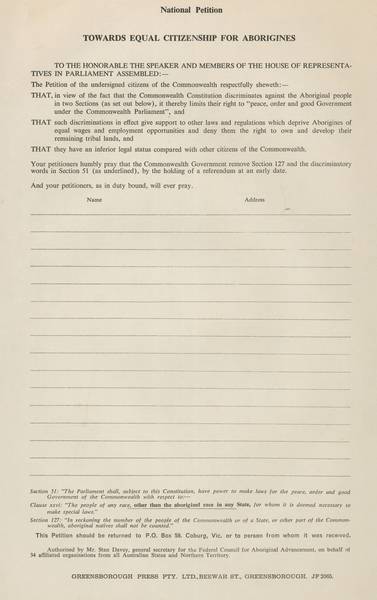
This form was circulated throughout the country during 1962-1963.
Source: Box 16, 'Petition referendum', Barry Christopher Papers, 1951-1981, MS7992/8, National Library of Australia
The wording of this petition was quite different from that of earlier petitions. It referred to 'discriminations' which gave 'support to other laws and regulations which deprive Aborigines of equal wages and employment opportunities and deny them the right to own and develop their remaining tribal lands'. The Melbourne executive composed and circulated a leaflet which explained the arguments for change.
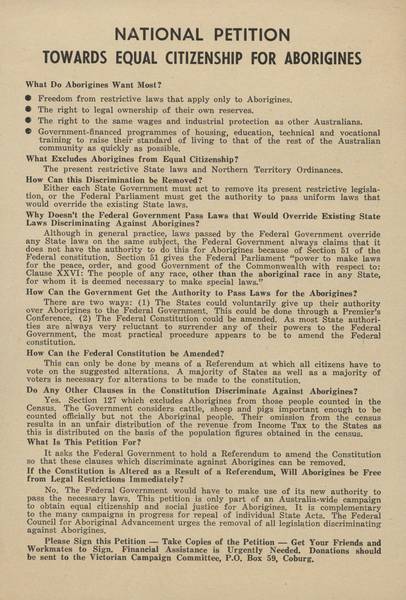
The 1962-63 National Petition campaign aimed to collect 250,000 signatures nation wide. The actual count was approximately 103,000 signatures. This Victorian National Petition Campaign Committee petition argued the case for the referendum.
Source: Box 16, 'Petition referendum', Barry Christophers Papers, 1951-1981, MS7992/8, National Library of Australia, Canberra
Pastoral industry awards, for example, contained clauses which excluded the many Aboriginal stockmen and women from the award wage and conditions enjoyed by other workers. Some Commonwealth laws specifically excluded Aboriginal people, such as the Tuberculosis Act 1948. In Queensland, under the Aborigines Preservation and Protection Act 1939 people could not marry without permission, nor were they legal guardians of their children. In Western Australia Aboriginal people could apply for a certificate of citizenship under the Natives (Citizens Rights) Act 1944, but they had to prove that they had cut off ties with their extended family, had been honourably discharged from the armed services and were not carrying certain contagious diseases. These were some of the 'discriminations' which the petition drafters had in mind.
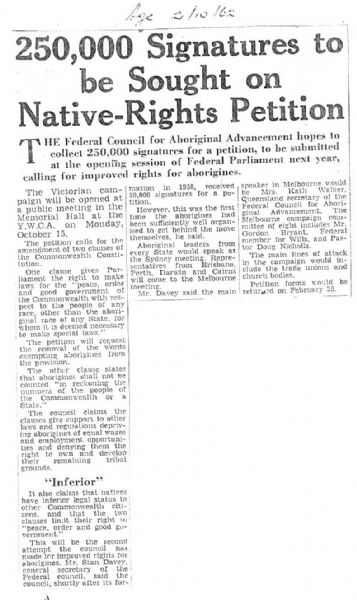
The National Petition for a referendum to change the constitution was launched in October 1962.
Source: The Age, 2 October 1962
For twelve months from October 1962 to October 1963 activists set up tables in the streets of all capital and regional cities and in country towns, urging people to sign the petition. Sporting clubs, community organisations, churches and unions were all targeted. This was a broad community education exercise as well as a petition gathering one. Gordon Bryant, MHR and President of the Aborigines' Advancement League, set out the arguments for Constitutional change.
Gordon Bryant, arguments for a referendum, 1962
Smoke Signals, October 1962
More info on Gordon Bryant, arguments for a referendum, 1962
Alick Jackomos recalls petition-gathering for the referendum with Doug Nicholls
Alick Jackomos, who was FCAA state secretary for Victoria at about this time, recalls his street campaigning, in this extract of an interview conducted by Leanne Miller on 12 December 1996:
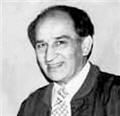
![]() Download Alick Jackomos recalls petition-gathering for the referendum with Doug Nicholls [MP3 594kb]
Download Alick Jackomos recalls petition-gathering for the referendum with Doug Nicholls [MP3 594kb]
View transcript of Alick Jackomos recalls petition-gathering for the referendum with Doug Nicholls
By the end of this year of intense activity over 100,000 signatures had been collected. This was short of the mark but impressive when we remember that the work was carried out after people had finished their work, on weekends, and at evening meetings.
The Melbourne-based national campaign committee now considered how to get the maximum effect from petition forms. They sorted over 6000 forms according to electorates and over a seven-week period in 1963, every sitting day in the House of Representatives began with the tabling of these petitions. One parliamentarian commented that the petitions had become so reliable and regular that they were like the prayer with which Parliament commenced. Even Prime Minister Robert Menzies tabled a petition from his upper-middle class Kooyong constituents on 11 September 1963. 'Will the Prime Minister support the petition?', Gordon Bryant asked. Menzies didn't answer this direct question but upheld the right of his constituents to petition parliament.
This Alick Jackomos interview is an extract of an interview undertaken to record the memories of members of the Federal Council for the Advancement of Aborigines and Torres Strait Islanders. This oral history project was a joint venture between Sue Taffe of Monash University and Koorie Arts Collective Inc. Leanne Miller from Koorie Arts Collective and Sue Taffe were the interviewers. This oral history collection of 29 interviews (audio tapes and transcripts) is held in the library of the Australian Institute of Aboriginal and Torres Strait Islander Studies in Canberra.
Related resources
People
Shirley Andrews
Gordon Bryant
Barry Christophers
Stan Davey
Alick Jackomos
Doug Nicholls
Organisation
383052
- 382980
- 382988
- 383016
- 383052
- 383092
- 383112
- 383128
- 383200
- 383216
- 383280

